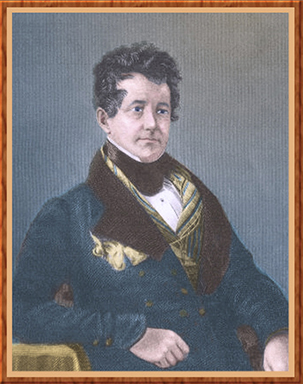
Historical Event Timeline
1842

Samuel G. Goodrich
Samuel Griswold Goodrich Literary Icon
In the history of 19th century American Children’s Literature, the writings of Samuel Griswold Goodrich (1793-1860) are acknowledged with bibliographic prominence. An accomplished grammarian and wordsmith, largely self-taught, Goodrich began his literary métier while still in his teen years. He left his home in Ridgefield, Connecticut and moved to the city of Hartford. In that setting, he established himself as a bookseller and publisher. In that same location, he began writing books under the pseudonym of Peter Parley. His career flourished and soon after he moved to Boston, Massachusetts. In Boston, he published many important works of children’s literature. The emphasis of these works often focused on the prospect of instilling worthy civic values to his formative audience.
In the history of 19th century American Children’s Literature, the writings of Samuel Griswold Goodrich (1793-1860) are acknowledged with bibliographic prominence. An accomplished grammarian and wordsmith, largely self-taught, Goodrich began his literary métier while still in his teen years. He left his home in Ridgefield, Connecticut and moved to the city of Hartford. In that setting, he established himself as a bookseller and publisher. In that same location, he began writing books under the pseudonym of Peter Parley. His career flourished and soon after he moved to Boston, Massachusetts. In Boston, he published many important works of children’s literature. The emphasis of these works often focused on the prospect of instilling worthy civic values to his formative audience.
One of the most successful of these books dedicated to that intention was
The Young American: or Book of Government and Law. In this text, Parley
instructs his readers in the classical genesis of the legal precedents of
western democratic government. Published in 1842, this book would travel
with New England missionaries to Hawaii. It was indicative of the type of
writing that the same group of missionaries would have used to inculcate an
understanding of United States literary legal precedents. This legacy of
educational progress would afford Hawaiians insight to and an appreciation
for the democratic principles that were employed in the creation of their
constitution.
Another facet of Goodrich’s remarkable career focused attention to
alleviating the plight of young authors endeavoring to be published in the
early stages of their profession. To that end, he founded and edited a journal
called The Token. This journal helped to launch the literary careers of a
number of outstanding 19th century authors. They included Henry
Wadsworth Longfellow (Paul Revere’s Ride, Evangeline and Song of
Hiawatha) and Nathaniel Hawthorne (The Scarlet Letter and The House of
the Seven Gables).
Samuel Goodrich’s bibliographic legacy is both distinguished and extensive;
however, it isn’t the only area of great achievement that he obtained in his
lifetime. He was elected to Massachusetts House of Representatives in 1836
and to the Massachusetts Senate in 1837. President Millard Fillmore
awarded him a consulship to Paris. Ever enterprising regarding publishing
2
projects, Goodrich used his time in Paris to have several of his works
translated in French. Ending his stay in France in 1855, he was presented
with a commemorative medal for service to the United States government.
While Samuel Griswold Goodrich had many milestones in his life, some
people feel that one of the most glowing tributes to him come in the form of
a reference to Peter Parley in James Joyce’s internationally acclaimed novel
Portrait of the Artist as a Young Man.
Selected Bibliography
Goodrich, Samuel Griswold. The Young American: or Book of Government
and Law. New York: Mark H. Newman and Co., 1847.
Tate, Merze. The Sandwich Islands Missionaries Create a Literature.
Church History. Vol. 31, No. 2. Oreland, Pennsylvania: June 1962, pp. 182-
202.
The Missionary Album: Sesquicentennial Edition 1820-1970. Honolulu:
Hawaiian Mission Children’s Society, 1969.
Peter Salter Research Historian RIHiUSA
Peter Salter Research Historian RIHiUSA
